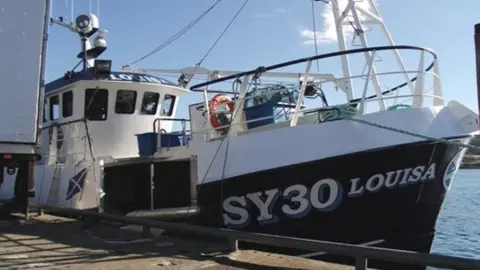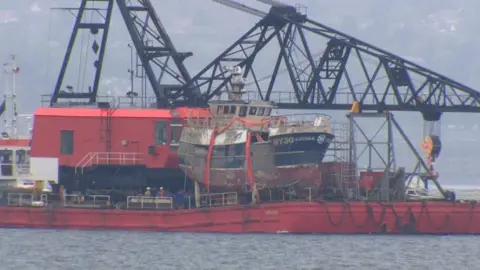Urgent lifejacket review after Louisa fatal sinking
An urgent review of how lifejackets are tested has been recommended following the deaths of the skipper and two crew of a crab boat that sank last year.
The Stornoway-registered Louisa sank on 9 April as it lay at anchor in calm seas off Mingulay in the Western Isles.
An investigation by the Marine Accident Investigation Branch (MAIB) found the lifejackets the men were wearing did not function as they should have done.
The probe also highlighted a delay in the rescue effort.
Other findings included that the Louisa's liferaft failed to deploy because a canister used to inflate it was empty following a service of the kit.
There was an alarm in the forward hold, the area which the MAIB believe became flooded and caused the sinking.
The alarm could have alerted the men but it had been disabled because it had previously sounded falsely and woken the crew while they were trying to sleep.
The bodies of Chris Morrison, 27, from Harris, and Martin Johnstone, 29, from Halkirk, Caithness, were recovered following the sinking.
The body of skipper Paul Alliston, 42, from Lewis, was lost during a lifeboat crew's attempts to recover him and remains missing.
Only Lachlann Armstrong, 27, from Stornoway, Lewis, survived after swimming ashore.
The MAIB said the men who died in the incident were wearing approved lifejackets, but the survival aids did not work as would have been expected.
 Police Scotland
Police ScotlandAn urgent review of lifejacket testing protocols by the Maritime and Coastguard Agency (MCA) has been recommended by the MAIB in a newly-published report of its investigation.
Chief Inspector of Marine Accidents Steve Clinch said: "A lifejacket should turn an unconscious person onto their back and keep their airway clear of the water.
"It is therefore of concern that the skipper and two crew were tragically found unresponsive and face down in their lifejackets when the rescue services arrived on scene.
"The results of lifejacket trials undertaken by the MAIB and of lifejacket testing commissioned by the MCA following the accident strengthen that concern.
"Therefore, as a matter of urgency, I am recommending the MCA to conduct further research to confirm or otherwise the suitability of historical and extant lifejacket water performance test protocols."
 Alasdair MacLennan
Alasdair MacLennanThe Louisa had been anchored close to shore in Mingulay Bay.
The skipper and crew, who had been working long hours before anchoring late the previous evening, were asleep onboard, said the MAIB.
Investigators believe the boat's deck wash hose flooded the hold and the crew were woken by the Louisa "sinking rapidly".
The four men escaped to the aft deck, activated the boat's emergency position indicating radio beacon (EPIRB) and put on lifejackets.
However, they were unable to inflate the liferaft as they abandoned the vessel.
Louisa's EPIRB was detected and the coastguard was alerted.
But the MAIB said "confusion over terminology resulted in delays before search and rescue units were sent to the scene".
The investigation of the incident involved raising the wreck of the crab boat and taking it to Clydebank.

A spokeswoman for the MCA said: "This is a deeply tragic incident and our thoughts remain with the families of these fishermen, who've suffered a terrible loss.
"Saving lives at sea is our highest priority, and we strive to ensure that our search and rescue techniques are continually reviewed in order to deliver an effective and efficient emergency response."
She added: "The MCA is continuing to collaborate with the MAIB on the contents of this report in order to address the recommendations put forward."
A spokesman for Louisa fishing vessel owners, Duncan and Murdo Kennedy, said: "The tragic events of 9 April 2016 resulted in the loss of three fine fisherman and our thoughts remain with the families of Martin Johnstone, Chris Morrison, Paul Alliston and surviving crew member, Lachlan Armstrong.
"We have fully cooperated with the MAIB inquiry and are committed to implementing the report's recommendations. We hope the wider issues raised in the report will lead to improved safety for all those working at sea and prevent any similar incident from happening."
